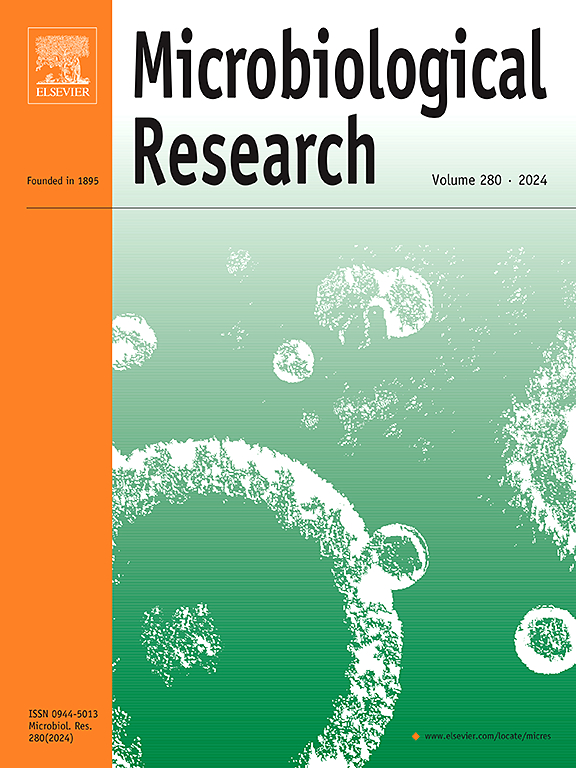Arginine kinase McsB and ClpC complex impairs the transition to biofilm formation in Bacillus subtilis
IF 6.1
1区 生物学
Q1 MICROBIOLOGY
引用次数: 0
Abstract
Robust biofilm formation on host niches facilitates beneficial Bacillus to promote plant growth and inhibit plant pathogens. Arginine kinase McsB is involved in bacterial development and stress reaction by phosphorylating proteins for degradation through a ClpC/ClpP protease. Conversely, cognate arginine phosphatase YwlE counteracts the process. Regulatory pathways of biofilm formation have been studied in Bacillus subtilis, of which Spo0A∼P is a master transcriptional regulator, which is transcriptionally activated by itself in biofilm formation. Previous studies have shown that Spo0A∼P transcript regulation controls biofilm formation, where MecA binds ClpC to inhibit Spo0A∼P-dependent transcription without triggering degradation. It remains unclear whether McsB and ClpC regulate biofilm formation together and share a similar non-proteolytic mechanism like MecA/ClpC complex. In this study, we characterized McsB and ClpC as negative regulators of biofilm formation and matrix gene eps expression. Our genetic and morphological evidence further indicates that McsB and ClpC inhibit eps expression by decreasing the spo0A and sinI expression, leading to the release of SinR, a known repressor of eps transcription. Given that the spo0A and sinI expression is transcriptionally activated by Spo0A∼P in biofilm formation, we next demonstrate that McsB interacts with Spo0A directly by bacterial two-hybrid system and Glutathione transferase pull-down experiments. Additionally, we present that McsB forms a complex with ClpC to dampen biofilm formation in vivo. Finally, we show that YwlE acts as a positive regulator of biofilm formation, counteracting the function of McsB. These findings suggest that McsB, ClpC, and YwlE play vital roles in the transition to biofilm formation in Bacillus subtilis, providing new insights into the regulatory mechanisms underlying biofilm development and sharing a similar non-proteolytic mechanism in biofilm formation as MecA/ClpC complex.
精氨酸激酶McsB和ClpC复合物损害枯草芽孢杆菌向生物膜形成的过渡。
在寄主壁龛上形成强大的生物膜有利于有益芽孢杆菌促进植物生长和抑制植物病原体。精氨酸激酶 McsB 参与细菌的发育和应激反应,通过 ClpC/ClpP 蛋白酶使蛋白质磷酸化并降解。相反,同源精氨酸磷酸酶 YwlE 则会抵消这一过程。已对枯草芽孢杆菌生物膜形成的调控途径进行了研究,其中 Spo0A∼P 是一个主转录调控因子,在生物膜形成过程中可被自身转录激活。先前的研究表明,Spo0A∼P 转录调控控制着生物膜的形成,其中 MecA 与 ClpC 结合抑制 Spo0A∼P 依赖性转录,而不会引发降解。目前还不清楚McsB和ClpC是否像MecA/ClpC复合物一样共同调控生物膜的形成并具有类似的非蛋白水解机制。在本研究中,我们将 McsB 和 ClpC 鉴定为生物膜形成和基质基因 eps 表达的负调控因子。我们的遗传学和形态学证据进一步表明,McsB 和 ClpC 通过降低 spo0A 和 sinI 的表达来抑制 eps 的表达,从而导致已知的 eps 转录抑制因子 SinR 的释放。鉴于在生物膜形成过程中 Spo0A∼P 会激活 spo0A 和 sinI 的转录表达,我们接下来通过细菌双杂交系统和谷胱甘肽转移酶牵引实验证明了 McsB 与 Spo0A 的直接相互作用。此外,我们还发现 McsB 与 ClpC 形成复合物,在体内抑制生物膜的形成。最后,我们发现 YwlE 是生物膜形成的正向调节因子,能抵消 McsB 的功能。这些研究结果表明,McsB、ClpC 和 YwlE 在枯草芽孢杆菌向生物膜形成的转变过程中发挥了重要作用,为生物膜形成的调控机制提供了新的见解,它们在生物膜形成过程中与 MecA/ClpC 复合物具有类似的非蛋白水解机制。
本文章由计算机程序翻译,如有差异,请以英文原文为准。
求助全文
约1分钟内获得全文
求助全文
来源期刊

Microbiological research
生物-微生物学
CiteScore
10.90
自引率
6.00%
发文量
249
审稿时长
29 days
期刊介绍:
Microbiological Research is devoted to publishing reports on prokaryotic and eukaryotic microorganisms such as yeasts, fungi, bacteria, archaea, and protozoa. Research on interactions between pathogenic microorganisms and their environment or hosts are also covered.
 求助内容:
求助内容: 应助结果提醒方式:
应助结果提醒方式:


